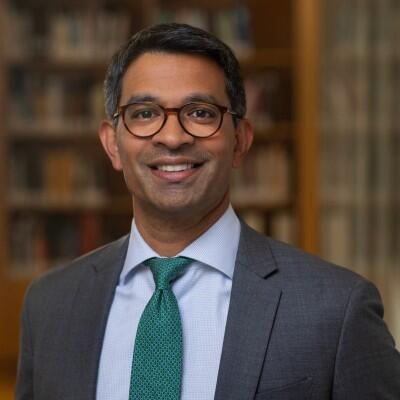You have /5 articles left.
Sign up for a free account or log in.
Shankar Prasad and I both received our doctorates at Brown University. His is in American and comparative politics and mine is in sociology and demography. After a stint as a professor at New York University, Shankar returned to Brown for a series of ever-impactful leadership roles, culminating in his appointment in 2022 as dean of the School of Professional Studies and VP for academic innovation.
Earlier this year, Shankar decided to embark on a new adventure, leaving Brown to become the chief strategy officer at Carnegie. Shankar generously agreed to answer my questions about his new role, broader trends in higher education and career advice.

Q: Tell us about Carnegie and your primary goals as the company’s chief strategy officer. Why did you decide to make this move at this point in your career?
A: Carnegie is a higher education solutions partner with practice areas in branding, marketing, enrollment, online learning, student success and institutional planning. In my role, I oversee our enrollment division and a new division on leadership advisory, strategic planning and student success initiatives.
I’m joining Carnegie at an interesting and important time —we are holding ourselves accountable to the promise of delivering the most innovative solutions in higher education, and the challenges that we are facing as an industry today are truly complex. It’s a challenge that excites me. Which leads me to my why …
Q: You and I have lived through some very stressful times in our higher ed careers, including the pandemic. This time, it feels worse. What advice do you have for higher education leaders who are trying to navigate their institutions through the uncertainty and chaos of the Trump administration?
A: I’ve spent my career focused on the power of education as a transformative force for learners of all backgrounds. What excites me about joining Carnegie is the opportunity to take that experience and scale it—helping institutions of all types, no matter their size or focus, meet the challenges ahead in a way that keeps students at the center.
Given how complex the higher education landscape is—and more on this later—being able to partner with presidents, provosts and deans to help understand the potential impact to their institution, and what steps they can take to mitigate this impact, is incredibly important. For example, we are working with a number of institutions to think about how they can strengthen their student support work to improve retention outcomes and career development, among other areas. Similarly, we are partnering with institutions of all sizes to develop online programs to help them reach new learners and provide more flexible learning options for students.
I love this work. Having served in a number of leadership roles at Brown, I know what kind of pressure is on academic leaders. I also know how deeply these leaders believe in the mission of their organizations and their desire to put the student at the center of their work. My job, the job of our entire organization, is to serve as a solutions partner, regardless of the specific challenge they are facing, to help make the job a little easier.
Great question. On the one hand, recent activity from Washington, D.C., is unrelenting and alarming, particularly at a moment when faith and trust in higher education are already lower than it has historically been. On the other hand, our mission—to help transform brilliant students of today to extraordinary leaders of tomorrow—hasn’t changed and I would argue that it’s more important than ever. Much of what we’re going through reminds me of leading through the pandemic. Those were truly unprecedented times, with COVID impacting the financial and operational foundations of our institutions.
And yet, if you asked any higher education leader what their main priority was during that time, it was to protect the health and safety of their students and the broader community. One of my key lessons from that time was staying true to our mission and leading with transparency. I wrote a recent blog post on how I think college and university leaders need to lead with courage and conviction during this time of challenge. We should remind ourselves that no matter how stressful and scary this time can be, it’s significantly scarier for the communities that we serve, especially our students.
Q: In the years I’ve known you, I’ve always been impressed by your willingness to take on new challenges. If you were going to provide career advice to a newly minted Ph.D. who may be interested in following a nontraditional academic career path, what would that advice be?
A: Lean into the core skills of the doctoral education enterprise—learning to ask important questions, finding answers and failing quickly along the way until you find the right solution—and develop an expertise, quickly. I would also note that attitude really matters—I try to stay super positive and try to evaluate every challenge I face as a puzzle: “What would it take to be able to double growth in this degree?” or “What would it take to launch a new program in a competitive landscape?” I find that approaching problem-solving from this angle, instead of a yes or no, helps bring stakeholders together and clarify expectations for the kind of resources, structure and design that would lead to success.
On a more personal level, I have greatly benefited from the generous support of mentors, and so I would encourage all of us, regardless of our leadership level, to find people we can help and support along the way. Higher education is a small world, so being able to help one another provides the right foundation for future collaborations between peers.




